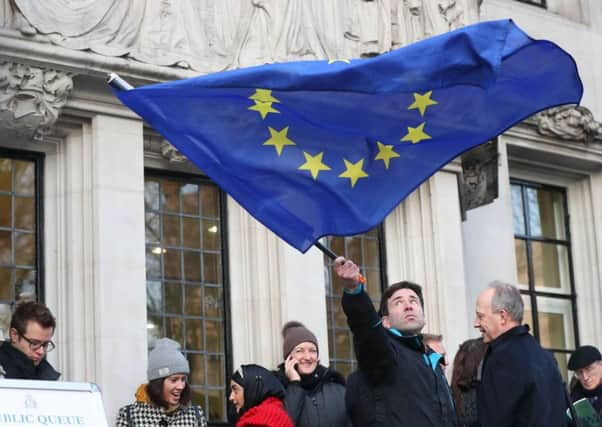NATIONAL: EU braces itself for Brexit trade talks


A document seen by reporters in Brussels suggests EU leaders and chief negotiator Michel Barnier could begin ‘internal preparatory discussions’ on a future trade relationship and a transition deal in a move which could offer Prime Minister Theresa May hope for talks.
The draft conclusions for next week’s European Council summit of EU leaders, which are subject to change, calls for work to continue to achieve ‘sufficient progress’ on withdrawal issues of a financial settlement, the Irish border and citizens’ rights, to unlock the second stage of talks to focus on trade.
Advertisement
Hide AdAdvertisement
Hide AdBut it warns that Britain has not made a ‘firm and concrete’ commitment on what Brussels sees as its financial obligations, echoing Mr Barnier’s concerns that a ‘disturbing’ deadlock over the size of Britain’s exit bill means he cannot recommend moving on from divorce talks to discussions about future trade relations when leaders of the 27 remaining EU states meet in Brussels on Thursday.
His recommendation made it all but certain that trade talks will be delayed at least until at least the end of the year, and will heighten pressure on the UK government to make preparations for a possible ‘no-deal’ Brexit.
But the draft paper offered signs of hope that Mr Barnier and EU states could at least begin exploring trade and transition arrangements, with the aim of moving on to those issues if agreement can be reached at December’s Council summit.
Meanwhile, an aide to the Treasury’s ministerial team dismissed calls by Tory grandee Lord Lawson for Chancellor Philip Hammond to be sacked.
Advertisement
Hide AdAdvertisement
Hide AdFormer chancellor Lord Lawson accused Mr Hammond of undermining Brexit negotiations, claiming that his refusal to release money now for preparations for a no-deal Brexit was ‘very close to sabotage’.
But Chris Philp told BBC Newsnight: ‘That’s nonsense. Nigel Lawson was a great chancellor in the 1980s, but that was 30 or 40 years ago, and he certainly doesn’t speak for the modern Parliamentary Conservative Party.’
It came as Labour called for Mrs May to change the EU (Withdrawal) Bill, claiming it was not going before the Commons next week because the government was afraid pro-Europe Tory rebels would back amendments to it.
Shadow Brexit secretary Sir Keir Starmer told the BBC: ‘The Tories’ Repeal Bill is simply not fit for purpose. It would give huge and unaccountable power to ministers and puts vital rights and protections at risk.
‘Theresa May must start listening to the legitimate concerns of Labour and some of her own MPs by urgently changing approach.’